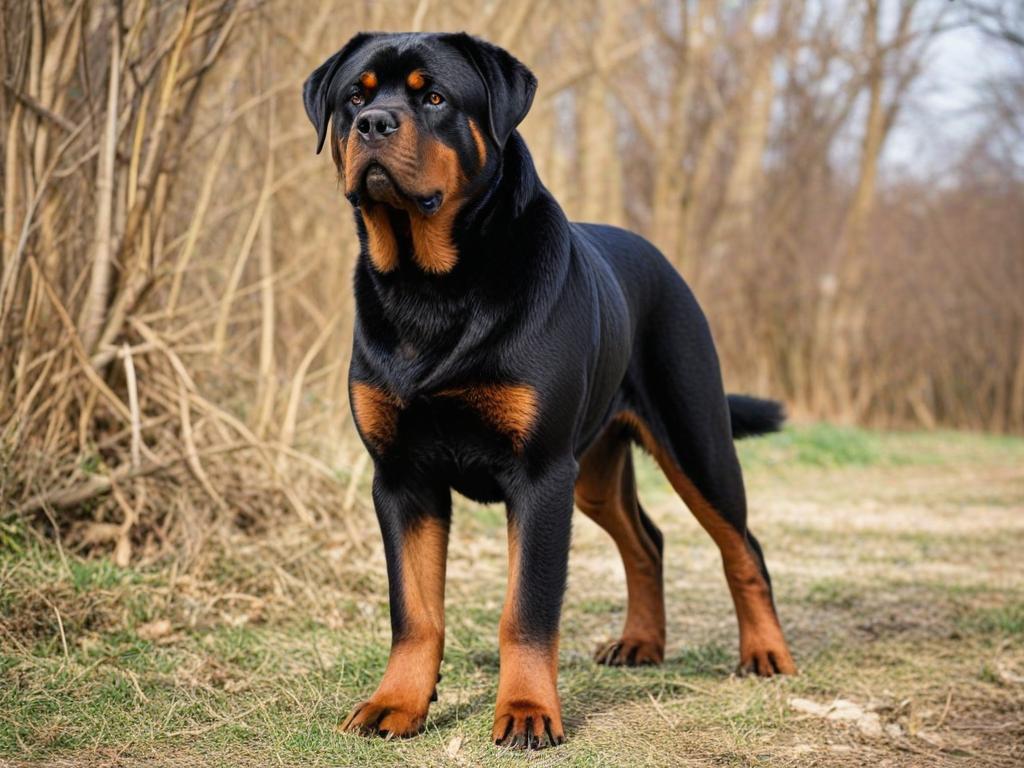
The Rottweiler is a robust and powerful breed known for its strength, loyalty, and versatility. This article delves into the characteristics, origin, lifestyle, personality, lifespan, interesting facts, grooming needs, food habits, and care guidelines for the Rottweiler.
Characteristics
Rottweilers are medium to large-sized dogs, typically weighing between 80 to 135 pounds and standing 22 to 27 inches tall at the shoulder. They have a solid and muscular build with a distinctive black coat and rust-colored markings on their face, chest, and legs. Their short, dense coat is straight and coarse. They have a broad head, strong jaw, and expressive dark brown eyes.
Origin
The Rottweiler traces its origins back to the Roman Empire, where they were used as herding and guard dogs. As the Roman legions traveled, these dogs were left behind in areas that are now modern-day Germany. In the town of Rottweil, they were bred with local dogs to create the Rottweiler we know today, primarily used for driving cattle to market and protecting the butcher’s money.
Lifestyle
Rottweilers are highly adaptable and can live in various environments, but they thrive best in homes with space to roam and play. They require regular exercise to maintain their physical and mental health, including daily walks, playtime, and activities that challenge their intelligence, such as obedience training and dog sports.
Personality
Rottweilers are known for their confident and calm demeanor. They are loyal, affectionate, and protective of their families. They can be aloof with strangers but are not inherently aggressive. Proper socialization from a young age is crucial to ensure they develop a well-balanced temperament. They are intelligent and eager to work, making them excellent candidates for various tasks, including search and rescue, therapy, and service work.
Lifespan
The average lifespan of a Rottweiler is around 8 to 10 years. While generally healthy, they can be prone to specific health issues such as hip and elbow dysplasia, heart problems, and certain cancers. Regular veterinary check-ups and a healthy lifestyle can help manage these risks.
Interesting Facts
1. Ancient Roots: Rottweilers are one of the oldest herding breeds, with a history dating back to the Roman Empire.
2. Versatile Workers: They have been used in various roles, including herding, guarding, police work, and search and rescue.
3. Strong and Powerful: Rottweilers are known for their physical strength and endurance, making them excellent working dogs.
Grooming
Rottweilers have a low-maintenance coat that requires regular brushing to remove loose hair and keep their coat shiny. They shed moderately, with more significant shedding typically occurring twice a year. Routine grooming includes brushing their teeth, cleaning their ears, and trimming their nails. Regular bathing is necessary to keep their coat clean, but over-bathing should be avoided to prevent skin irritation.
Food Habits and Preferences
Rottweilers require a balanced diet that meets their nutritional needs based on their age, size, and activity level. High-quality commercial dog food is generally suitable. Due to their size and appetite, portion control is crucial to prevent obesity. Treats should be given in moderation, and fresh water should always be available. Consulting a veterinarian can help determine the best diet for individual dogs.
Guidelines for Care
1. Exercise: Provide regular exercise, including daily walks and playtime, to keep your Rottweiler physically and mentally stimulated.
2. Training: Use positive reinforcement techniques for training. Rottweilers are intelligent and eager to learn but can be strong-willed, so consistency and patience are essential.
3. Socialization: Expose your Rottweiler to various environments, people, and other animals from a young age to promote good behavior and reduce anxiety.
4. Health Check-ups: Regular veterinary visits are essential to monitor their health, keep up with vaccinations, and prevent common health issues such as hip dysplasia, heart problems, and certain cancers.
5. Grooming: Regular brushing and routine grooming will keep your Rottweiler’s coat healthy and looking its best. Pay attention to ear cleaning, nail trimming, and dental care.
6. Diet: Provide a balanced diet with appropriate portions to prevent obesity. Monitor their weight and adjust their diet as needed.
7. Protection: Rottweilers are naturally protective and should be trained and socialized to ensure they can differentiate between normal and threatening situations.
In conclusion, Rottweilers are strong, loyal, and intelligent dogs that make excellent companions and working dogs. With proper care, attention, training, and socialization, they can bring joy and protection to any household.
